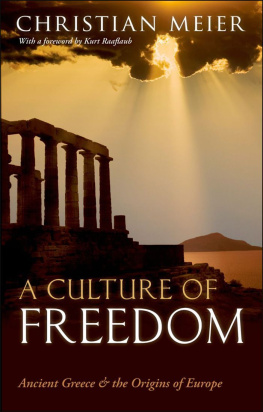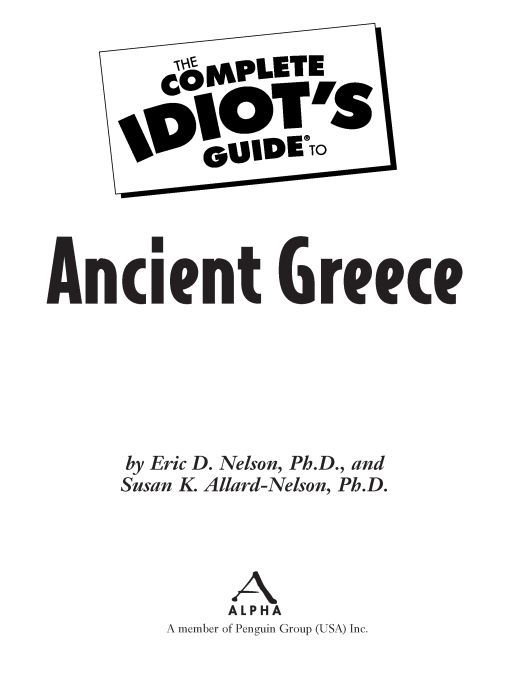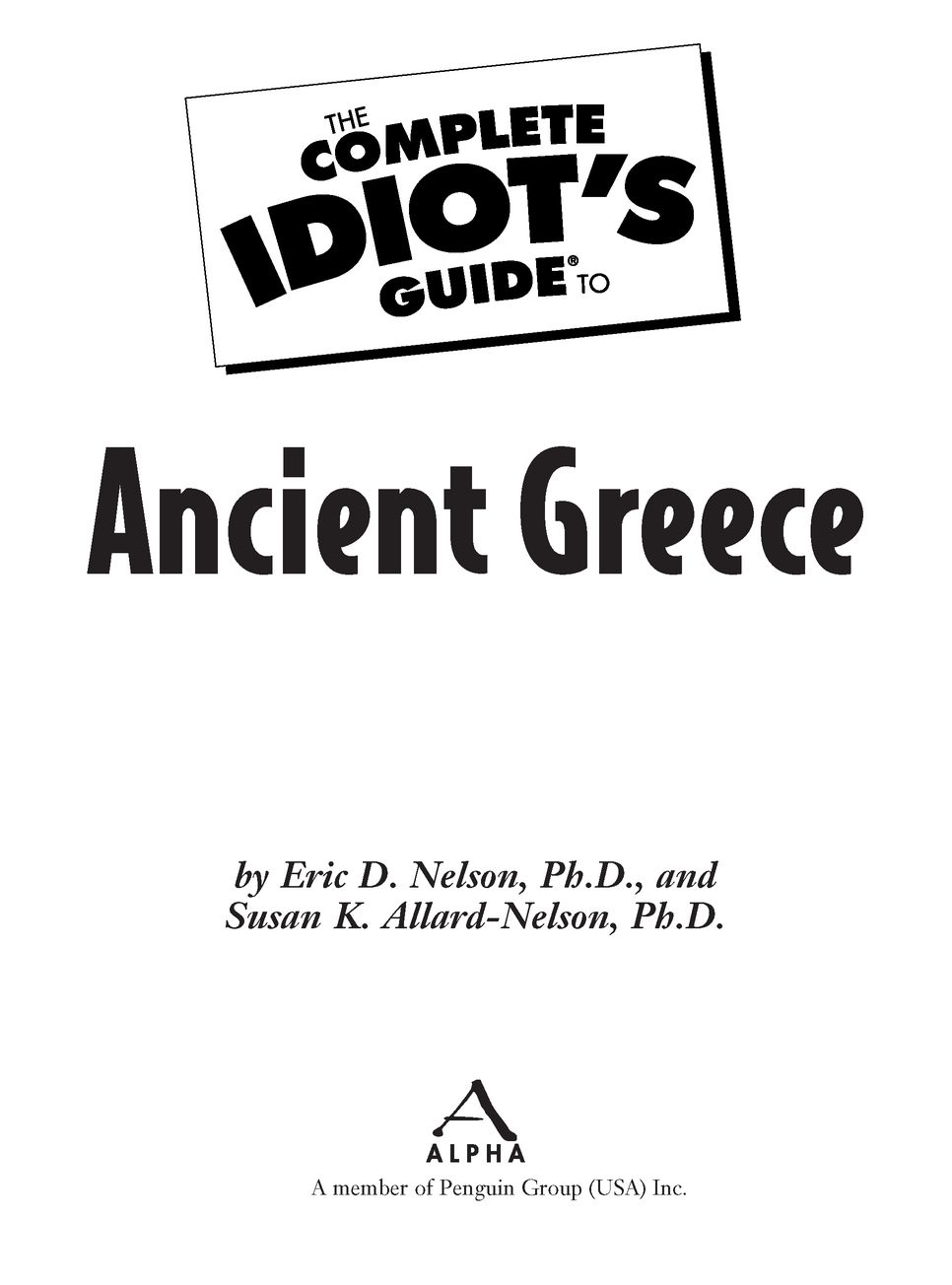Table of Contents
With deep gratitude and abiding love, we dedicate this book to Erics parents, Dolaine and Betty
Lou Nelson, in memory of Susans parents, James and Priscilla Rowan.
Foreword
This book makes a timely appearance as the Olympic Games have once more returned to their birthplace, Greece. Greek culture is the foundation of our modern western society, and many of its values are embedded in the western unconscious. These pages, then, are in part a process of self-discovery.
One can sum up the Greeks in two words, the agon and aret, the contest and excelling. Competition is pervasive in the formation of the Greeks timeless legacy, whether we think of the interaction of individuals in a democracy, or that of atoms within a void. Western politics, science, rhetoric, theater, art, and philosophy emerge from the extraordinary tension between individual and community that characterized the everyday life of Greek poleis, or city-states.
The ancient Greeks placed a high value on freedom, human dignity and beauty, and the power of human reason to order and comprehend our world. But their humanism was tempered by a profound sense of the limitations imposed by destiny and mortality. That is the paradox of the Greek tragic worldview. What does it mean to be human? Why do we suffer? Why were we ever even born? Yet there is nobility in the human condition that no Greek god could equal. Oedipus punishes himself and works his own redemption. The hero Odysseus declines the gift of immortality from Calypso and would rather just go home to Ithaca.
The Nelsons, one a Classicist, the other a philosopher, give you a thorough and insightful introduction to not only the essentials but also the essence of Greek history and culture and its legacy. They do so with a balanced perspective, fully aware of the shortcomings of this ancient society as well as its enduring virtues. From the Trojan War to the Italian Renaissance and our present world, the compelling story of the Greeks unfolds in an engaging interrelation of chronology and topics.
A unique feature of this book on the Greeks is the extent to which it incorporates discussion of their significant influence on the Romans throughout, not just in a brief epilogue. It is one of Romes claims to fame that she preserved and passed on much of the rich culture of the Greeks. Western civilization is in fact the heir of both peoples, and you can continue the story by turning to Professor Eric Nelsons The Complete Idiots Guide to the Roman Empire. We in the United States are the modern Romans, and your journey of self-discovery will then be complete.
Rochelle E. Snee
Rochelle E. Snee, Associate Professor of Classics at Pacific Lutheran University, is the author of articles on late antiquity in the Greek east and reviews on books covering a wide range of the Greco-Roman world. She is currently completing The Life of St. Marcian: Greek Text, Translation and Commentary.
Introduction
But those that understood him smild at one another, and shook their heads; but for mine own part, it was Greek to me. Casca, from Shakespeares Julius Caesar 1.2.278-80
A working knowledge of Classical Greek language, literature, culture, and history has been the hallmark of an educated and civilized individual for a long, long time. Such was the case when Caesar was assassinated (44 B.C.E.) and when Shakespeare wrote Julius Caesar (about 1599 C.E.), and it remains so today. Why is that?
Well, you cant chalk it up to victorious conquest. In fact, the ancient Greeks never really conquered anyone (except themselves, perhaps). For the most part, they were conquered by everyone else: first, (a good part of them) by the Persians, then (most of them) by the Macedonians, then (all of them) by the Romans and then (the leftovers) by the Parthians, Goths, Vandals, Turks, and so on. In spite of the conquerors, however, something about ancient Greece persisted.
You cant chalk it up to religious or cultural domination. Christianity and Islam, which eventually dominated most of the pagan world, were often so hostile to Greek pagan culture that they attempted to obliterate its influence, accomplishments, and memory. And yet the legacy and influence of ancient Greece can be found throughout Christian and Islamic texts, histories, cultures, and empires.
You certainly cant chalk it up to easy reading! Greek literature, philosophy, and scienceand, above all, the Greek language itselfhave perplexed and frustrated students, intellectuals, and citizens of the world since the days of the Romans (who, fortunately, did not stamp them out, like almost everything else that annoyed them). And, as people who have labored through a lot of Greek, let us simply say that the snob appeal alone is not worth the effort.
So, we return to the question: Why has knowledge of classical Greek art, language, history, and culture been a requisite part of a well-rounded education for so long? We would say that successive generations, cultures, and religions found things in the history, literature, and culture of ancient Greece that not only intrigued and challenged them, but that were necessary to their own development, as well. For example, they found a rich and expressive language; subtle, perceptive, and insightful approaches to philosophy, science, mathematics, politics, and medicine; a reasoned exploration of the cosmos, existence, human nature, and knowledge; and some of the best stories ever told! And, yes, they also found biases, prejudices, and misperceptions, and, sometimes, they perpetuated them. In any case, even a quick glance at history will reveal that the Hellenized (that is, people who are educated, even indirectly, in Classical Greek learning, literature, and culture) have played pivotal roles in human history. It will also reveal that many peoplefrom Afghan tribal chieftains to American politicianshave laid claim to ancient Greek traditions. In this book, we hope to introduce you to the intrigue of ancient Greece and, even more importantly, help you uncover your own Greek leanings and legacies. Then, in the future, you can smile knowingly, instead of wondering (like Casca) why the Greeks are being mentioned yet again.
To present the ancient world to a modern audience, however, weve found it necessary, at times, to cheerfully embrace inconsistency. For example, given calendars that do not match, we will sometimes show a date as, say 428/7 B.C.E. (to show that the ancient year crosses over the modern ones; not to show that we are confused); given the inconsistency between Greek spellings and (the better known) Latin spellings, particularly of names and places, we will sometimes substitute ae (Latin) for ai (Greek); and given utterly verbose ancient authors, we will sometimes shorten quotes considerably (while simultaneously attempting to retain the original sense and meaning!). We invite you to join us in the adventure!
What Youll Learn in This Book
Well, youll learn a lot. Because were covering roughly 4,000 years of rich and complex cultural history, weve divided the book into five sections. The first section gives you a broad overview (to help you get your bearings); the next three sections cover the major historical periods; and the last section deals with the legacy of ancient Greece, as it was passed on to both the ancient and modern worlds.


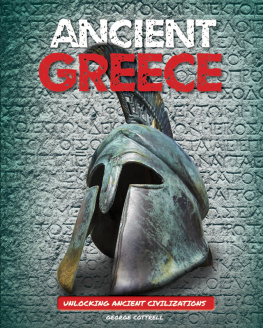
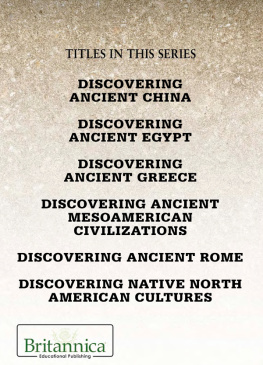

![Michael Lovano - The World of Ancient Greece: A Daily Life Encyclopedia [2 Volumes]](/uploads/posts/book/268736/thumbs/michael-lovano-the-world-of-ancient-greece-a.jpg)


